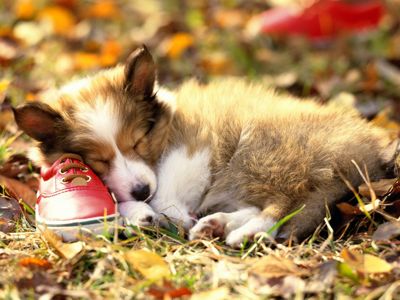We often get asked “what constitutes a GOOD puppy school?” by our students and clients. Those questions prompted this article, to make this information available to everyone out there who is thinking about getting a puppy.
At COAPE, we aim to educate the world about positive training techniques. If more people are aware of the different types of training out there, and the benefits and drawbacks of each type, they will be able to choose a puppy school with confidence. Puppies that go to a good puppy school right from the start have a better chance of growing up to be well-balanced, confident adults. This will mean that these same puppies will have a much better chance of staying in one home, with their original owner, instead of being labelled as a “problem dog” and passed around from shelter to owner and back. To this end, we have put together a list of factors you need to take into account when going to a puppy school.
When you first make contact:
Does the trainer explain what methods they use up front?
It is important that you know whether or not the trainer allows physical punishment and/or choke chains in class. Choke chains can damage your dog’s neck, so be very careful! To give you an idea of how sensitive a neck is, just take your finger and press it length-wise, lightly against the middle of your throat. It is extremely uncomfortable, even with such light pressure. Now imagine someone jerking your neck with a metal chain. We recommend that you use a harness for your puppy. Classes that use choke chains will often tell you that your puppy can only attend class if they are 4 – 6 months old. This is because the puppy’s neck is a little hardier from this age onwards, although damage can still be done.
Physical punishment – hitting, jerking and smacking – and shouting can hinder the bond between puppy and owner. In addition, all physical punishment can often result in general suppression of behaviour, hand shyness, learned helplessness or aggression. The only thing your puppy is likely to learn is that training is a scary time when my owner is going to punish me. Where fear or pain is involved, learning cannot take place.
Remember that even one such an incident is enough to make a big impact on your puppy and might mean that your puppy will be reluctant to ever go to class again.
Does the trainer explain school policies and costs up front?
It’s important that the trainer explain school fees and policies up front. For instance, what happens if class is cancelled because of rain – do you lose that lesson or not? What is their policy regarding refunds? Make sure that you are informed of all these things so as to avoid nasty surprises in future.
Do find out if the school allows the whole family to join in the class. It is important for puppies to be exposed to as many different people as possible, and this includes children. It is a good idea for a school to allow children to attend – provided they are supervised of course.
Does the trainer request proof of your puppy’s vaccinations and de-worming?
Puppies can join in with a puppy class as soon as they have had their first inoculation. Before this, it is dangerous to take your puppy anywhere where there are other dogs that may not have been vaccinated as puppies are very susceptible to diseases, such as distemper, parvovirus, hepatitis, adenovirus and para-influenza. De-worming is just as important as worm larvae can be passed from dog to dog where there is faeces lying around. It is important to have assurance that the class you are attending allows only vaccinated pups to attend.
Is your trainer qualified?
Can the trainer prove that he/she has undergone training through a reputable organization? There are a lot of trainers out there who have schools simply based on the fact that they “have owned dogs all their lives”. Please be very careful of this.
The puppy school should preferably be sponsored or endorsed by a reputable brand, company or Veterinarian. Affiliations like this are essentially a quality guarantee – no self-respecting corporate entity or Veterinarian will link their name to a terrible school. This will also mean that the school is responsible to someone and that you can give feedback about the school. Schools without accreditation won’t necessarily care about feedback, as they aren’t accountable to anyone.
At the first class:
First Impressions: the instructor & the venue
When you get to class, is the instructor dressed neatly? Is the venue clean and neat as well? This might seem unimportant, but an instructor who doesn’t takes his/her appearance and the state of his/her venue seriously is likely to be just as indifferent about the importance of his/her role as your puppy school trainer.
Is the venue securely fenced? Nothing can be more tragic than a puppy bolting into the road and getting hurt or killed. Please make sure that the venue is safe and secure.
Are all the dogs in the class more or less the same age, or are there adult dogs mixed in?
There is a lot of debate going around about this subject. What we can do is offer you some concrete facts to explain why we say older dogs should not be allowed in a class with puppies.
Puppies are dogs under the age of 4 months. Dogs between the age of 4 months and 2 years are classified as adolescents. All dogs over 2 years of age are adults.
Adolescent and adult dogs have different play patterns than puppies. They get really rough and pushy. Adult dogs also have their permanent teeth and much more jaw strength than the puppies. Puppies can get hurt by this rough and tumble and can also be scared. At roughly 4 months – this varies within breeds – puppies will start exhibiting hazard avoidance behaviour. Basically, mother nature is telling the puppy to be suspicious of all new things as they could equal a threat. Any new interaction that has a bad outcome – such as being knocked over by an older dog – will most likely result in the puppy being afraid to approach strange dogs in the future.
In some schools, an older “neutral” dog is sometimes included in class to “teach” the puppies. Whether or not this is beneficial is also a big debate among professionals. Such an adult dog has to be very well-socialized, have a stable personality (not likely to snap at puppies), and be very obedient. Even then, it could be considered a bit unfair to the older dog as he will be mobbed by a group of unruly puppies with sharp, baby teeth!
Is there dog faeces lying around?
Dog faeces can carry different diseases and worms over to other puppies. It is extremely important that any puppy class you attend encourage owners to pick up after their puppies.
How many instructors are there vs. the number of puppies?
If the class has 15 puppies and only 1 instructor, that instructor will not be able to help each and every client personally. This means that you won’t receive the attention and time you are paying for. Ideally there should be 1 instructor and/or assistant per 6 puppies at maximum.
Information
Puppy school is not just for the puppies; it’s for the owner’s too! Your trainer should be able to teach you everything you will need to know to raise a healthy, well-balanced dog.
It is important that the trainer discuss topics such as sterilization, socialization and habituation, developmental stages, etc. It’s important that the owner learns what he/she can expect from his/her puppy as the puppy matures. This can be a lot of information to remember, so a good school should be able to give you information that you can take home and read again and again.
The school should also encourage you to practice what you have learned at home with your puppy. Dogs don’t generalize well. The more places you practice with your puppy, the better! The trainers should make you aware of this fact and give “homework” at each class.
All trainers should be knowledgeable on what you can expect from your puppy depending on the breed. Each breed has specific characteristics that can influence training.
You should be informed about any on-going training that the school offers. Puppy school is only the first step – your dog can learn new things his whole life through. On-going classes are also a wonderful way of keeping your dog well-socialized.
Do you end up spending the whole class just letting the puppies play together?
Puppy socialization is very important. Your puppy does need to learn how to play with other puppies, and he/she needs to learn that other dogs are friends and not a threat. However, a good puppy class shouldn’t focus only on puppy socialization. It is important that your puppy learn some basic commands and how to walk on a loose leash. Teaching your puppy these commands in a class, as well as practicing at home, has the benefit of helping your dog understand that he needs to listen to you whether there are other dogs around or not. A class that is one big play session might teach your puppy that once there are other dogs around, he can do whatever he likes! Your puppy should also learn some basic life skills such as frustration tolerance, bite inhibition, etc. in class.
Ideally the instructor should also teach you how to get your puppy used to be touched and handled all over – this is especially important so that visits to the groomer and the Vet are less stressful! It will also come in handy should you ever need to inspect your dog for injury, clip his/her nails, or maybe pull out a thorn. If your puppy isn’t used to being touched on his feet, you could have a battle on your hands. Secondly, but equally as important, this will help you to familiarize yourself with your puppy’s body and make it easier to notice when something is out of the ordinary.
Puppy class is, when all is said and done, still an educational facility where owners and puppies not only have fun, but also are given useful lessons to prepare them for their lives together. This means dealing with puppy problems, preventing future problems, and allowing the pups to get to know all different kinds of dog breeds and people.
Does the instructor explain and demonstrate each behaviour/trick taught to the puppies?
Nothing is quite as frustrating (and embarrassing) as standing around because you have no idea what to do. The instructor should let all the owners know which action/obedience command to practice next, and should make sure that each owner knows how to go about it. It is important that you not only know what to teach your dog, but also how, to guarantee successful training.
Does the trainer intervene when one puppy bullies another, or not?
Some schools will just leave dogs to “establish dominance” and “sort each other out”. Please watch out for this! Dogs are NOT wolves. They may be related to them, but they do not live in the wild, nor do they act like wolves, or live in packs. Applying wolf behaviour to your dog would be like applying chimpanzee behaviour observed at the zoo to you, simply because we are both primates. It’s like chalk and cheese!
If your puppy is bullied in class, chances are that the only thing he will learn is to be meaner than any dog approaching him or he will get pounced on. Puppy class should be a safe place where puppies can play and learn that other dogs are not scary and that they don’t need to be afraid. A good trainer will keep an eye on all puppy interaction and intervene when play gets too rough for one puppy.
Does the trainer help you with your specific puppy problems?
No two puppies are the same and no two owner-puppy combinations are the same! There might be another owner in class with exactly the same type of dog that you have, but they won’t experience all the same problems you do. A good trainer will make time to ask each owner where they most need help, be it house training, jumping up, bite inhibition, food guarding, etc. You should leave puppy class armed with more knowledge that you came in with, and have the answers to your puppy questions.
On-going support
Sad to say, most puppy owners don’t expect any support from the trainers after puppy school is finished. A good school should be able to offer you the on-going support and advice you need as well as on-going classes for your dog as he matures, or at least be able to recommend another school that does. Also be sure to ask if the trainer is willing to do home visits if necessary.





